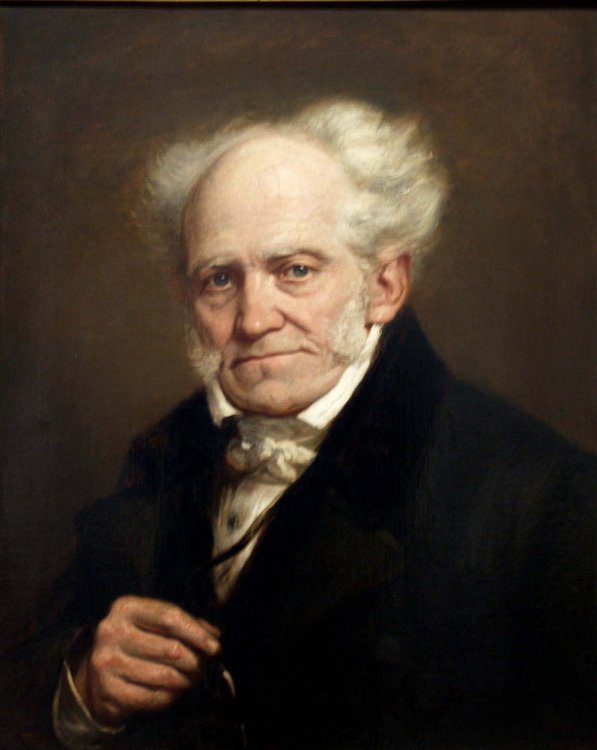Official:
Arthur Schopenhauer. February 22, 1788 – September 21, 1860. German philosopher. Frequently called “the philosopher of pessimism"
Life and Work:
1. “If a man does not love solitude, he will not love freedom,” stated Arthur Schopenhauer. As for the famous German philosopher himself, he did love solitude and had a very negative attitude to fame. He stated paradoxically that building a monument to someone in his lifetime means admitting that the descendants will not do that.
2. One of the world's most famous philosophers Arthur Schopenhauer was born on the 22nd of February, 1788. His father, Heinrich Floris Schopenhauer, was a man of business, but quite educated and liberal for his time.
3. As a child, Schopenhauer liven in a French family for two years, then studied in a private gymnasium in Hamburg, and then polished his education in Great Britain for half a year.
4. Arthur's father wanted him to become a merchant, and Schopenhauer Jr. even began a trading career in Hamburg. But after Heinrich Schopenhauer's strange death, Arthur started to prepare for the faculty of medicine of the University of Goettingen and even entered it. But then his love of wisdom, which is how the word “philosophy” is actually translated, won.
5. We may well call Schopenhauer the way we once called Nikita Khruschev – a voluntarist. In 1819, he published what later turned out to be the main work of his life – The World as Will and Representation. However, Schopenhauer himself did not overestimate this world and believed it to be “the worst of all worlds.”
6. He said that optimism was not only a ridiculous, but also a truly immoral way of thinking, a bitter jest about unspeakable human suffering. In contradiction to absurd optimism, he introduced the term “pessimism,” having coined it from the Latin word “pessimus,” which means “the worst.” And so, Schopenhauer was called the philosopher of pessimism.
7. Schopenhauer was the first to use the term “motivation.”
8. Schopenhauer placed a high value on Kant's main works and philosophical ideas of Buddhism. A bronze statuette of Buddha and a bust of Kant graced his office.
9. The walls of the office boasted portraits of Goethe, Shakespeare and Descartes, as well as engravings depicting dogs: Schopenhauer was not too fond of people, but became one of the first animal advocates in Germany.
10. They say that Schopenhauer did not know his mother's love: she was a writer and hostess of a literary salon, self-consumed, too busy writing and communicating with the people she attracted to her house in Weimar – among them was, for example, great Goethe.
11. Even when the mother and the son lived in the same house, they often communicated through letters, because they were in a fight.
12. Schopenhauer was characterized by tremendous ambition and rare, almost paranoid suspiciousness and distrust in people. Sometimes he slept with a weapon in his arms and, afraid of robbers, hid his valuable belongings in secret places.
13. Unrequited love for the leading lady of Weimar Opera Karolina Jageman turned Schopenhauer into a misogynist.
14. The misanthrope and philosopher of pessimism described family relationships as follows: two porcupines on a cold night are trying to huddle together to get warm but cannot do it because of their pricks. Marriage doubles the responsibilities and halves the rights, believed Schopenhauer and remained a sworn bachelor.
15. Schopenhauer's other thoughts are also worth quoting. “Talent hits a target no one else can hit; Genius hits a target no one else can see.” “There are three kinds of aristocracy: of birth and rank, of money, and the most distinguished type – of the mind or intellect.” “The world is ruled by three authorities: mind, power and happiness.” With people of limited ability modesty is merely honesty. But with those who possess great talent it is hypocrisy.”
16. Schopenhauer is very strict towards the human race. He foredoomed humanity to eternal fluctuation between need and boredom. He was even more intolerant towards “explicit discovery of mental bankruptcy” – this is what the philosopher said about the addiction to card games. “Incapable of exchanging ideas, people exchange cards,” said Schopenhauer.
17. As for Schopenhauer himself, he loved to exchange thoughts, he was fluent in five languages in addition to Latin and read a lot.
18. Humanity did not hold a grudge and duly appreciated Schopenhauer. Fame did catch up with the philosopher after all – descendants built a monument to Schopenhauer in Frankfurt am Main.
19. Schopenhauer's views significantly influenced many scientists and writers, among them are Friedrich Nietzsche, Erwin Schrödinger, Albert Einstein, Sigmund Freud, Carl Jung, Leo Tolstoy, Jorge Luis Borges. Infatuation with Schopenhauer's ideas was reflected in Richard Wagner's opera The Ring of the Nibelung. The composer even sent Schopenhauer a signed copy.






















